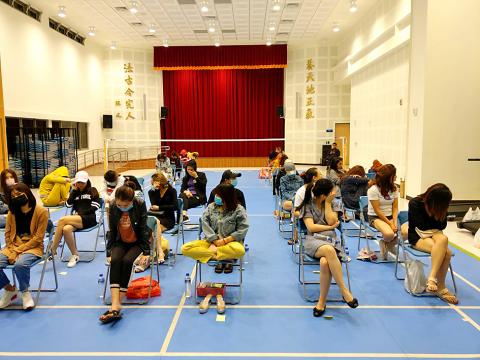A total of 52 people, including 36 foreigners, were arrested on Thursday during a raid on a sex trafficking operation in Taipei, police said yesterday.
Acting on a tip-off, a team of about 100 police officers surrounded a building on Kangding Road in the city’s Wanhua District (萬華) at 6pm before entering with search and arrest warrants, police officials told a media briefing.
During the raid, 10 Taiwanese suspected of operating the sex trafficking ring were arrested, along with 42 suspected sex workers — 28 from Thailand, six from Vietnam, two from China and six Taiwanese, police said.

Photo courtesy of the Taipei City Police Department via CNA
Police also seized accounting ledgers and other evidence from the scene, said Chen Wei-jen (陳偉仁), head of an investigation squad at the Wanhua Precinct.
The 10 Taiwanese suspected of running the prostitution ring have been handed over to the Taipei District Prosecutors’ Office for investigation, while the foreign suspected sex workers are being held in detention by immigration authorities pending deportation based on the findings of the probe, Chen said.
The six Taiwanese suspected sex workers would be charged under the Social Order Maintenance Act (社會秩序維護法), Chen added.
The foreigners entered Taiwan on tourist visas and were inhumanely exploited by the sex trafficking ring, police said.
The alleged sex traffickers were luring women from overseas to Taiwan with offers of work at massage and beauty parlors, but were coercing them into prostitution on arrival, police said.

‘WIN-WIN’: The Philippines, and central and eastern European countries are important potential drone cooperation partners, Minister of Foreign Affairs Lin Chia-lung said Minister of Foreign Affairs Lin Chia-lung (林佳龍) in an interview published yesterday confirmed that there are joint ventures between Taiwan and Poland in the drone industry. Lin made the remark in an exclusive interview with the Chinese-language Liberty Times (the Taipei Times’ sister paper). The government-backed Taiwan Excellence Drone International Business Opportunities Alliance and the Polish Chamber of Unmanned Systems on Wednesday last week signed a memorandum of understanding in Poland to develop a “non-China” supply chain for drones and work together on key technologies. Asked if Taiwan prioritized Poland among central and eastern European countries in drone collaboration, Lin

The Chien Feng IV (勁蜂, Mighty Hornet) loitering munition is on track to enter flight tests next month in connection with potential adoption by Taiwanese and US armed forces, a government source said yesterday. The kamikaze drone, which boasts a range of 1,000km, debuted at the Taipei Aerospace and Defense Technology Exhibition in September, the official said on condition of anonymity. The Chungshan Institute of Science and Technology and US-based Kratos Defense jointly developed the platform by leveraging the engine and airframe of the latter’s MQM-178 Firejet target drone, they said. The uncrewed aerial vehicle is designed to utilize an artificial intelligence computer

Renewed border fighting between Thailand and Cambodia showed no signs of abating yesterday, leaving hundreds of thousands of displaced people in both countries living in strained conditions as more flooded into temporary shelters. Reporters on the Thai side of the border heard sounds of outgoing, indirect fire yesterday. About 400,000 people have been evacuated from affected areas in Thailand and about 700 schools closed while fighting was ongoing in four border provinces, said Thai Rear Admiral Surasant Kongsiri, a spokesman for the military. Cambodia evacuated more than 127,000 villagers and closed hundreds of schools, the Thai Ministry of Defense said. Thailand’s military announced that

CABINET APPROVAL: People seeking assisted reproduction must be assessed to determine whether they would be adequate parents, the planned changes say Proposed amendments to the Assisted Reproduction Act (人工生殖法) advanced yesterday by the Executive Yuan would grant married lesbian couples and single women access to legal assisted reproductive services. The proposed revisions are “based on the fundamental principle of respecting women’s reproductive autonomy,” Cabinet spokesperson Michelle Lee (李慧芝) quoted Vice Premier Cheng Li-chiun (鄭麗君), who presided over a Cabinet meeting earlier yesterday, as saying at the briefing. The draft amendment would be submitted to the legislature for review. The Ministry of Health and Welfare, which proposed the amendments, said that experts on children’s rights, gender equality, law and medicine attended cross-disciplinary meetings, adding that